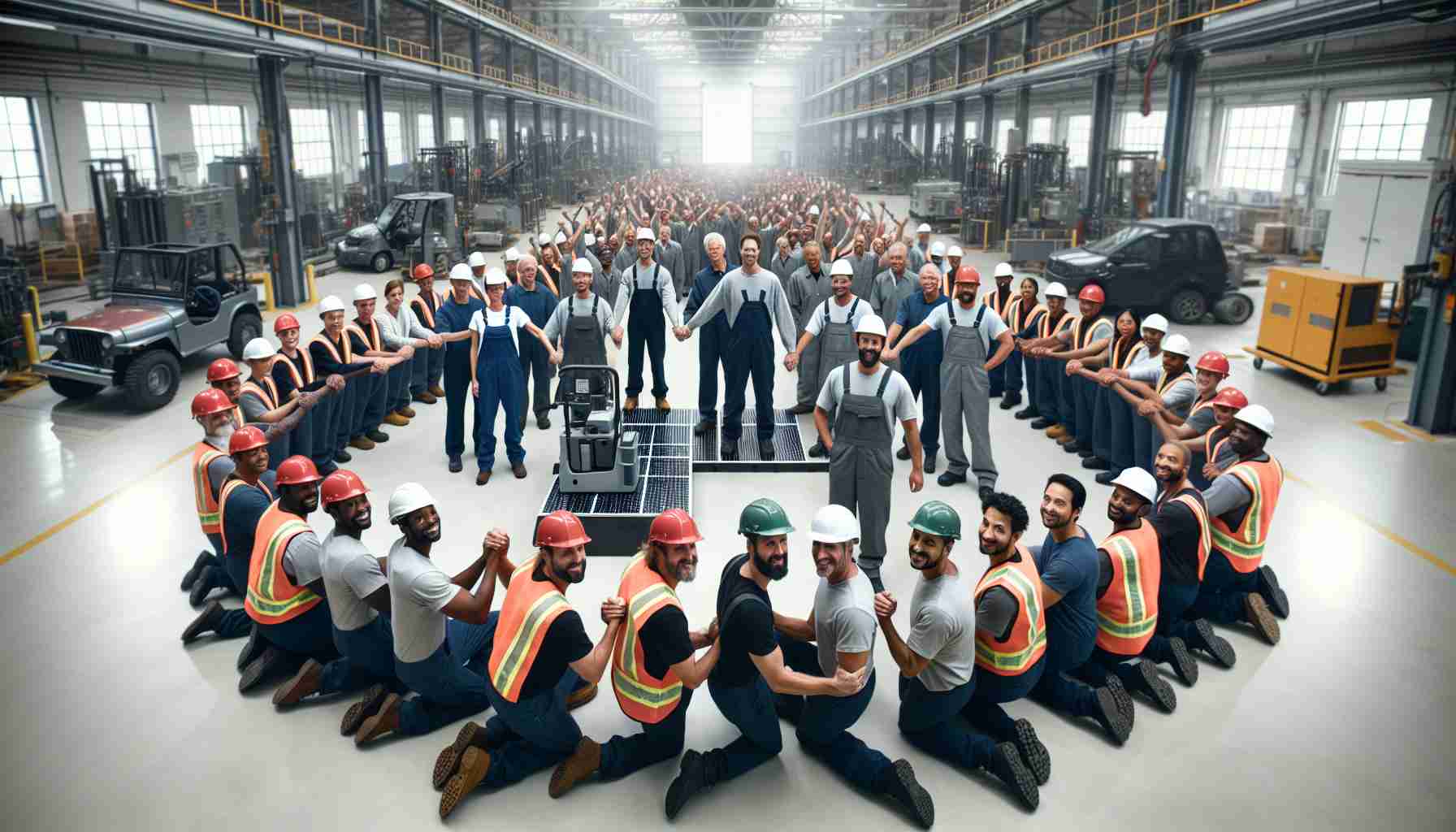- The UAW is advocating for better working conditions at the new BlueOval SK EV battery plant in Kentucky.
- Workers report serious safety hazards, including inadequate personal protective equipment and exposure to hazardous conditions.
- There is a growing demand for fair wages and benefits comparable to those at nearby Ford assembly plants.
- Union organizers aim to unite workers to address safety and compensation concerns effectively.
- Current unrest among workers reflects a broader push for respect and improved conditions in the EV industry.
- The situation illustrates a potential turning point for labor rights in Kentucky’s expanding electric vehicle sector.
In a historic push, the United Auto Workers Union (UAW) is rallying for change at the massive BlueOval SK electric vehicle battery plant in Glendale, Kentucky. Spanning over eight million square feet and powered by a $6 billion investment, this facility is on track to become the largest EV battery plant globally—promising 5,000 jobs for the community.
However, not all is smooth sailing. Workers, who are already feeling the heat of production hazards, are voicing serious safety concerns. From a lack of personal protective equipment to exposure to hazardous mold, employees report daily threats to their well-being. As one Quality Operator highlighted, management seems narrowly focused on wages, overlooking the critical importance of creating a safe work environment.
Union organizers are amplifying these concerns, pushing for solidarity among the workforce. Their motivation? A safer workplace alongside fair pay and benefits akin to those enjoyed by workers at Ford’s nearby assembly plants. The company has hinted at wage increases in response to union activities, but many feel misled and disillusioned, igniting further unrest.
As experts point out, moments of uncertainty often serve as catalysts for union formation. In a climate where workers are demanding respect and safety, the atmosphere is ripe for change. With the backing of Kentucky’s political landscape remaining neutral, the stage is set for a potential labor revolution in this burgeoning industry.
Key takeaway: As Kentucky establishes itself as a leader in the EV battery sector, the fight for worker safety and rights takes center stage, highlighting the critical need for organizations like the UAW to champion fair labor practices.
UAW’s Fight for Worker Rights: A Turning Point in the EV Battery Industry
Overview of the Situation at BlueOval SK Plant
The United Auto Workers Union (UAW) is advocating for substantial changes at the BlueOval SK electric vehicle battery plant in Glendale, Kentucky. This plant, which requires a monumental $6 billion investment and covers more than eight million square feet, is poised to be the largest EV battery facility worldwide, offering 5,000 jobs to the local community.
Despite the promise of job creation, employees are raising grave safety concerns. Reports indicate inadequate personal protective equipment and exposure to hazardous working conditions, like mold, jeopardizing workers’ health. A Quality Operator from the facility noted that management’s focus seems primarily on wages, neglecting essential safety standards in the workplace.
Key Issues Surrounding the BlueOval SK Plant
Worker Safety:
A significant point of contention is the safety of workers. The UAW is drawing attention to alarming health risks, pushing for improved safety protocols and equipment.
Wages and Benefits:
The management has hinted at possible wage increases, yet many employees feel misled. The disparity in wages and benefits compared to workers at Ford’s assembly plants has become a rallying cry for union organizers.
Political Landscape:
The political environment in Kentucky appears neutral; however, this may allow for a smoother pathway for union activities as the local workforce seeks to elevate their working conditions and rights.
Frequently Asked Questions
1. What are the main safety concerns reported by workers at the BlueOval SK plant?
Workers have reported severe safety hazards, including insufficient personal protective equipment, exposure to hazardous mold, and inadequate training for managing workplace dangers. These issues have prompted calls for urgent attention from both the company and the union.
2. How has management responded to the union’s push for better wages and working conditions?
While management has acknowledged the union’s activities by promising wage increases, many workers remain skeptical and feel that these promises are insufficient in addressing the broader concerns over safety and working conditions.
3. What could be the implications of unionizing for the electric vehicle battery industry in Kentucky?
If successful, the unionizing efforts at BlueOval SK could set a precedent for labor practices across the EV battery sector, potentially leading to improved safety standards, better wages, and enhanced worker representation in an increasingly important and competitive industry.
Additional Insights
Market Trends:
The electric vehicle market is growing rapidly, with an increased demand for sustainable transportation solutions. This growth places a spotlight on the need for fair labor practices, particularly as public scrutiny rises about the environmental and social impacts of EV manufacturing.
Innovations and Sustainability:
With the likelihood of advancements in production methods and materials, companies in the EV battery sector will need to factor in worker safety as they embrace innovations. Sustainability in labor practices is as crucial as sustainability in production.
Future Predictions:
As labor movements continue to energize, the prospects for stronger unions within high-demand sectors like EV production could reshape the landscape, contributing to more equitable working conditions and ultimately influencing the entire industry standard.
For more insights on labor relations and trends in the automotive industry, visit UAW.
